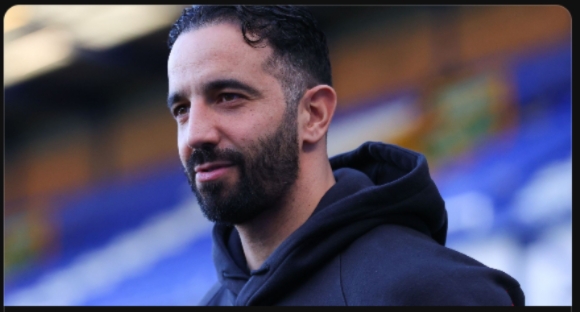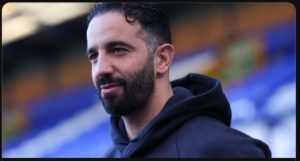
I Don’t Know, If I Know, I Will Change It” – Ruben Amorim’s Honest Take on Manchester United’s Consistency Issues
Ruben Amorim, the highly-rated Portuguese coach linked with Manchester United’s managerial post, delivered a strikingly candid response after being questioned about his ability to make the team consistent following their 1-1 draw against Everton. His words, “I don’t know, if I know, I will change it,” encapsulate the enigma surrounding Manchester United’s persistent struggles. It also opens a window into the kind of introspective, adaptable thinking that could define his approach if he were to take charge at Old Trafford.
A Club in Search of Consistency
Manchester United’s struggles with consistency have been well-documented. Since Sir Alex Ferguson’s retirement in 2013, the club has cycled through a string of managers, each with different philosophies but none managing to restore the club to its former dominance. From David Moyes to Erik ten Hag, each appointment has initially sparked hope, only to ultimately fall short of achieving sustained success.
This season, Manchester United have shown glimpses of brilliance but have also faltered against lower-ranked opponents. The draw against Everton was yet another example of the team’s erratic performances. Moments of tactical discipline and attacking flair are too often overshadowed by defensive lapses, a lack of cohesion, and an inability to maintain intensity over the course of 90 minutes.
Amorim’s Pragmatic Philosophy
Amorim’s statement reflects his pragmatic and methodical approach to football management. Unlike managers who offer platitudes about ‘turning things around’ or ‘working harder,’ his response suggests that he sees inconsistency as a complex issue that cannot be fixed with a simple tweak. Instead, it requires deep analysis, adaptability, and patience.
At Sporting CP, Amorim has built a reputation for tactical flexibility and youth development. His 3-4-3 system, which helped Sporting win the Primeira Liga title in 2020-21, relies on a disciplined defensive structure coupled with dynamic attacking movement. He has demonstrated an ability to evolve his tactics based on his squad’s strengths and weaknesses—a trait that would be crucial at a club like Manchester United.
What Is the Root Cause of United’s Inconsistency?
To evaluate whether Amorim could truly “change it” at Manchester United, one must first understand the root causes of the club’s inconsistency:
1. Tactical Instability
United’s tactical approach has lacked a clear identity in recent years. Under Ten Hag, the team has oscillated between counter-attacking football and possession-based play, often struggling to execute either effectively. The lack of a defined system has led to inconsistent performances, particularly against well-organized opponents.
2. Mental Resilience and Leadership Issues
One of the hallmarks of Ferguson’s United was their mental fortitude. They could be losing deep into stoppage time but still find a way to win. In contrast, the current squad often crumbles under pressure. The lack of strong, vocal leaders on the pitch has been evident, with Bruno Fernandes occasionally struggling to rally his teammates in difficult moments.
3. Recruitment and Squad Imbalance
United’s recruitment strategy has been erratic. While there have been some successful signings, such as Lisandro Martínez and Casemiro, others have failed to justify their hefty price tags. The squad remains unbalanced, with deficiencies in key areas such as central midfield and right-back.
4. Injuries and Fatigue
An alarming number of injuries have also disrupted United’s rhythm. Key players like Luke Shaw, Raphael Varane, and Marcus Rashford have missed significant chunks of the season, making it difficult for Ten Hag to establish a settled lineup.
Can Amorim Change Manchester United’s Fortunes?
Amorim’s coaching style suggests he could bring a refreshing change to United’s tactical setup. His ability to instill discipline, his emphasis on youth development, and his tactical flexibility would be assets in dealing with the club’s inconsistency.
1. Tactical Clarity and Adaptability
Amorim would likely implement a structured tactical system tailored to his squad’s strengths. If he deploys his favored 3-4-3, it could benefit players like Diogo Dalot and Alejandro Garnacho, who thrive in wide spaces. At the same time, his adaptability ensures that he wouldn’t rigidly impose a system that doesn’t fit United’s current squad.
2. Reviving the Club’s Mentality
A key challenge for Amorim would be restoring Manchester United’s winning mentality. He has successfully instilled a strong competitive mindset at Sporting, and his ability to extract the best from young players could be crucial in helping United’s next generation of stars—such as Kobbie Mainoo and Amad Diallo—step up and take responsibility.
3. Smarter Recruitment and Squad Building
United’s transfer dealings have often been criticized for lacking a long-term vision. Amorim’s track record at Sporting suggests he has a keen eye for talent and a preference for players who fit his system rather than big-name signings for the sake of star power. If given control over transfers, he could help streamline United’s recruitment strategy.
4. Player Development
One of Amorim’s biggest strengths is his ability to develop young talent. At Sporting, he nurtured players like Pedro Gonçalves and Nuno Mendes into elite performers. Manchester United’s academy remains one of the best in the world, and Amorim could play a vital role in transitioning young talents into first-team regulars.
Challenges Amorim Would Face at United
Even if Amorim were to take over at United, he would face significant challenges:
The weight of expectation: Managing United comes with immense pressure. The club’s fanbase demands immediate success, and patience is often in short supply.
Boardroom politics: The club’s decision-making structure has often been a hindrance rather than a help. Amorim would need clear backing and autonomy in recruitment.
Premier League adaptation: Amorim has yet to manage in the Premier League, and adjusting to its intensity and tactical demands would be a learning curve.
Conclusion
Ruben Amorim’s response—“I don’t know, if I know, I will change it”—is refreshingly honest. It highlights both the complexity of Manchester United’s inconsistency and his own introspective approach to problem-solving. If he were to take the job, his tactical acumen, youth development expertise, and pragmatic mindset could provide the long-term stability the club desperately needs.
However, success at Old Trafford would require more than just tactical innovation. It would demand patience, structural support from the club’s hierarchy, and a cultural shift within the squad. Whether Amorim is willing to take on such a monumental challenge remains to be seen, but if he does, his words suggest he will approach it with
the thoughtfulness and adaptability needed to truly make a difference.

Leave a Reply